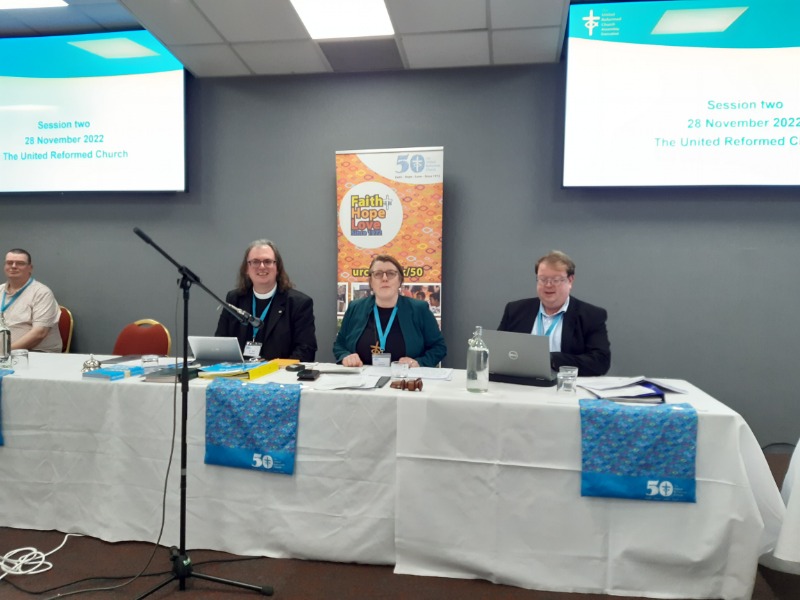The autumn meeting of the United Reformed Church (URC) Assembly Executive opened on 28 November at High Leigh Conference Centre, Hoddesdon, with a welcome by the Revd Fiona Bennett, Moderator of the URC General Assembly.
Session one
Lindsey Sanderson, Chaplain to the General Assembly Moderator, led worship with a reading by Luke 21: 25-26.
Lindsey spoke of the climate crisis, war, economic crisis, scenarios more threatening than had been the case for many decades.
Worship theme comes from Psalm 27: “Wait for the lord, be strong and let your heart take courage. Wait for the Lord.”
Lindsey explained that as Assembly Executive was meeting at the start of Advent, a season of waiting, the lectionary readings were from the first Sunday of Advent. Not only are the nights darker earlier, where we may long for lighter evenings, but with what’s going on in the world today: strike action, cost-of-living crisis, nurses taking strike action, we long more for Christ’s light in the world today, which cannot be overcome by the darkness.
Along these lines, Lindsey Invited Assembly Executive to sing Bernadette Farrell’s uplifting hymn Christ Be Our light in a new way, by singing all the verses first and then finally the moving chorus.
Lindsey then prayed for Assembly, followed by Andy Jackson, Head of Communications, who read from Isaiah 8:17, 9:17.
Fiona then delivered a short sermon on the Bible passage and the confusing nature of darkness we see in global emissions, lack of justice for all, in the Church and the many painful choices now being faced because the Church hasn’t implemented the changes that it knew needed to be made.
However, Fiona explained, the light of Christ penetrates the thickest darkness and asked “do we have the courage to work with God to do so as Jesus disciples, to embrace and be the change needed?”
Fiona concluded her sermon by quoting Maya Angelou: “I have the courage to trust love one more time and always one more time,” and Madeleine L’Engle: “We have to be braver than we think we can be because God is constantly calling us to be more than we are.”
Session two
Paper R1: MIND – lessons learned
Following discussion at this year’s General Assembly, the Ministerial Incapacity and Discipline (MIND) Advisory Group undertook to change the process so that a range of people are invited to feedback at the end of a case, to help with the ongoing review of the process.
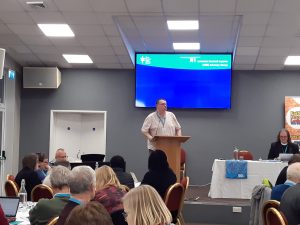
Only the Investigation Team and Assembly Commission were required to report, and this resolution allows others to contribute to the post-case process.
Greenbelt feedback
The Revd Philip Brooks commended to Assembly Executive the URC’s continued Associate Partnership with Greenbelt festival, which had been enabled by Mission Council (Assembly Executive’s predecessor). ‘It was our most ambitious Greenbelt ever,’ said Mr Brooks, of the URC’s presence of the 2022 festival in August. It had been delayed for two years by pandemic and involved volunteers from across the URC.
Roo Stewart, the URC’s Programme Support Officer for Church and Society, shared photographs, feedback and stories from this year’s festival. It was, he said, ‘a hugely enriching discipleship experience’ for those who volunteered.
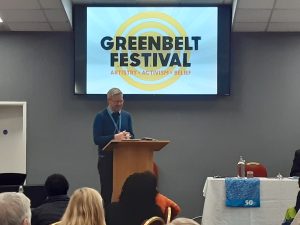
The URC ran yoURCafe, serving food that would otherwise have gone to landfill, enabling us to make it affordable to people under financial pressure. Mr Stewart mentioned that a third of food is tossed away in the UK, which has greater environmental impact than air travel. There were long queues at the cafe – ‘and not because our service was slow’. The most common comment from those who gave feedback was that there was a warm welcome.
The theme of the URC’s presence at Greenbelt was ‘Revolting Christians’. Information boards were placed around the site telling the stories of revolting Christians, with a prize for those who found them all. The café tent contained a display about revolting Christians in the URC.
The venue offered craft activities, talks and music from a huge range of URC talents, said Mr Strewart. Christian Climate Action and Operation Noah also contributed.
He said that the team worked hard to improve racial diversity but still have a way to go and will improve black representation next year.
Dr Sam Richards, Head of Children’s and Youth Work, reported on the URC’s youth activities at Greenbelt. A team of URC volunteers, led by three Children’s and Youth Development Officers, ran the Engine and the Dens, Greenbelt’s youth venue, which in earlier years had been run by the YMCA. The programme included a late-night eucharist and received very positive feedback. The team have agreed to run this work at Greenbelt for three more years, and are looking at ways to make it even better and more welcoming.
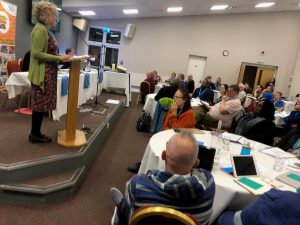
There was a service to celebrate the 50th Anniversary of the URC on the Sunday evening of the festival, and it was broadcast live on Zoom.
After the report, the Moderator, the Revd Fiona Bennett, said it filled her with joy to hear it and to think about how many lives had been impacted.
Paper H1: Roll of Ministers Policy
Mary Thomas, the new Convener of the Ministries Committee, proposed clarifications that seek to ‘tidy up’ the Roll of Ministers policy. The amendments to the policy, agreed by the 2018 General Assembly and updated by Assembly Executive in 2021, were designed to clarify and define:
- two new categories of active ministers
- the Synods’ role in the process
- the status of URC ministers overseas
- ministers on more than one roll, and
- the relationship between different categories and the Roll
The revised policy would also combine the Roll of Ministers and the Roll of CRCWs.
After alerting the Executive to changes in the most recent text of the policy, Ms Thomas took questions. One representative asked how this policy applies to ministers taking a career break, and another asked whether ‘overseas’ had been defined in the context of this policy. There was an additional question about what ‘non-active’ means. These questions were picked up in the discussion that followed, with one minister expressing ‘discomfort’ at the idea that, when ministers are ordained for life, they might be removed from categories of active ministry simply because they’d not found the right place to minister at a given time.
A former Assembly moderator said that the URC tends ‘to err on the side of generosity’ when ministers are in anomalous situations. In her experience, when it’s difficult to include people into defined categories, this is not in itself a reason to remove them from active categories.
In further discussion about ministers living permanently overseas, Ms Thomas indicated that there may be situations where ministers still want connection and pastoral care from their UK synod. She also clarified that the definition ‘non-active’ applies to anyone who does not fall within the active minister categories – and this would include ministers serving in another part of the world.
The Executive accepted the clarified policy unanimously.
Paper G5: Pensions Update
“Many questions were asked during the consultation,” URC Treasurer Ian Hardie began when presenting the Pensions’ Review Group’s update about the pensions’ change consultation process.
General Assembly authorised the consultation with the members of the two URC defined benefit pension schemes (one for ministers, the other for lay staff) after changes to the pension schemes were authorised by the General Assembly.
The responses, Ian continued, were divided between the proposals and the process, the changes were viewed as being widely accepted.
The consultation started on 22 September and ran to 22 November and was quickly implemented after General Assembly because “each year of delay in switching to a defined contribution scheme would cost considerably in excess of an additional £1m.”
This change was subject to provision being made for lay staff ill health retirement benefits. The group worked out this additional benefit and were able to produce drafts of consultation materials by the start of August. By mid-September, the legal reviews of the materials were finished, and the consultation began.
Simon Walking, National Synod of Wales, asked if there had been as much consultation with lay staff as there was with ministers. Tim Hopley, North Western Synod, also shared concerns about the consultation process for staff.
Ian Hardie said that the lay staff scheme was due to have its triennial valuation when the equity markets were in recent turmoil (after the short-lived mini budget) meaning that there would be even more pressures on future benefits if the scheme stayed as is. This is another example of why both schemes were being changed together rather than separately.
Mel Campbell, Northern Synod, asked if a standard resolution for employers, such as Synods, would be available.
Jane Baird, Deputy General Secretary (Admin and Resources) said that the Church had received legal advice saying that the URC was able to make decisions about the lay staff scheme which would bind the participating employers (Synods) to make those decisions.
Discussions about the lay staff ill health benefits being improved were being looked into.
It is hoped that the new scheme will be operational from 1 January 2023, as originally planned.
Another workshop about the changes is also planned.
Session three
Legacies of Slavery report
Sarah Lane Cawte, Convenor of Mission Committee, introduced Telling It As It Is – Confronting Racism in the Church, a short film by Prophet Motive Films in association with the URC Mission Committee.
Sarah reminded Assembly Executive of the making of an apology for the Church’s role in the transatlantic slave trade and how the apology was part of the URC’s aim in taking active steps to become an anti-racist Church, .
Sarah asked Assembly Executive to consider the question: “How can I listen to this and what can I do to act?”. She explained the film could be used as a means to opening up difficult conversations.
The film, narrated by Lindsey Brown, Mission Support Officer, is about uncovering white privilege in the Church and explains that the term “white privilege” is not referring to someone is being better off or having special treatment because they are white, but the undetectable privilege of not having to face daily micro-aggressions and judgements based on ethnicity or having assumptions made about where you come from or how you behave, or what you think.
“We don’t often see outright racist hatred in the Church,” explains Lindsey. “It’s more insidious … Black and ethnically-minoritised people experience racism in the church all the time, and it’s time to call it out.”
The film features a range of interviews with ethically-minoritised members of the URC who serve in a variety of positions.
Those featured include Philippa Osei, URC Youth Moderator-Elect 2022-2023; the Revd Dr Tessa Henry-Robinson, General Assembly Moderator-Elect 2022-2023; the Revd Andrew Mudharara, Minister of Daventry and Hinckley United Reformed churches within the East Midlands Synod; Revd Wilbert Sayimani, the first Black Clerk of Assembly within the Uniting Presbyterian Church in Southern Africa and who later served as Moderator of the Presbytery of Zimbabwe; and Karen Campbell, Secretary for Global and Intercultural Ministries.
The interviewees all share their experiences of racism in the Church, and the experiences of others shared with them as well as wider perspectives.
In the film, the Revd Dr Tessa Henry-Robinson, a womanist theologian and General Assembly Moderator-Elect 2022-2023, says: “When you’re not white, the colour of your skin matters every single day.”
In the opening sequences, Lindsey explains that the anti-racist conversation began in the URC in 2018. Many, she adds, didn’t see the need for it but this was because “the voices calling out for the issue to be addressed were not being heard”.
The film in part seeks to give a space for those voices to be heard.
“Together,” adds Lindsey, “we can listen, and we can act.”
Telling It As It Is, can be watched here:
Fiona thanked Sarah for presenting the film to Assembly Executive and thanked the interviewees for being part of the URC Family, and for sharing their experiences.
The Moderator then asked Assembly Executive to break out into groups to discuss the following questions “what do we feel, and how can we respond to what we have heard”.
Feedback from groups centred on priorities. For example one minister who has moved from Elephant and Castle to Stamford, queried whether the important steps of becoming anti-racist church would be as high a priority to a church in Elephant and Castle to one in Stamford where there is a lack of diversity; others spoke of being impressed that the Assembly Executive was able to watch the film together and that it would be good to focus what can we do to move forward not to look back. To change mindsets, to say hello to everyone, not just the people who look like you. Gratitude was also expressed to the URC for all that it is doing in this area.
Paper J2 and J3: Nominations
Helen Lidgett, Convenor of the Nominations Committee, presented paper J2 and tabled paper J3. Both propose new appointments to committees of the URC, in addition to those in paper J1. The resolutions were carried.
En bloc resolutions
The following resolutions were passed en bloc. En bloc resolutions are voted on without debate, having been deemed uncontroversial. This has no reflection on their importance. The full reports and resolutions in each case can be read here:
[https://urc.org.uk/general-assembly-assembly-executive-assembly-committees/assembly-executive/]
A1 – Former Moderators
Immediate Past Moderators of General Assembly, and some other former Moderators, will be Assembly Officers, to make up for the reduction of Moderators now that Assembly has one Moderator serving for one year.
D1 – Education and Learning: Cost of living
A one-off payment of £500 to URC students in response to the cost of living crisis.
D1 – Education and Learning: Continuing studies
New funding to support URC members in continuing studies.
F1 – Faith and Order
An update on the work of the Faith and Order Committee and thoughts on the proposal by the Church Life Review that it changes from a standing committee to an advisory group.
G1 – Finance: Accounts
Notice that the audited accounts for 2021 are now available.
G4 – Finance: Car expenses
A change to the level of expenses paid for travel by car. To balance the Church’s Environmental Policy with fairness to those dependent on cars, mileage rates will increase per passenger.
H2 – Lay Pioneers
An explanation of the safer recruitment and accreditation process for Lay Pioneers.
I1 – Mission report
An update on the recent work of the committee.
J1 – Nominations
New appointments to committees of the URC and information about how the Church life review has effected the nomination process.
M1 – Loyal Address
This paper contains the text of the loyal address sent to King Charles III by the Moderator and Clerk of General Assembly.
M2 – Risk register
Updates to the URC’s register of risks to its financial well-being, as identified by the review which started in 2021.
P1 – Local constitution amendment
A change to the wording of the model constitution for local churches, bringing it in line with the Structure of the URC.
P2 – Section Q Complaints Procedure
Revisions to the URC’s complaints procedure, making it more streamlined.
R2 – Size of Investigation Team
Increasing the maximum size of the URC’s investigation panel for ministerial discipline from 18 to 24.
S1 – Safeguarding annual report and appendix
Report of URC safeguarding data for 2021.
Emergency resolution – appointment of Synod Moderators
URC General Secretary John Bradbury presented an emergency resolution regarding the appointment of Synod Moderators, after the change of the annual Assembly Executive meeting to February (from 2024).
To avoid issues caused by gaps between appointments, Assembly Executive delegated to the Assembly Officers the authority to appoint Synod Moderators in cases that cannot wait until the next meeting of the General Assembly.
The Moderator’s Chaplain then concluded the session with prayer.
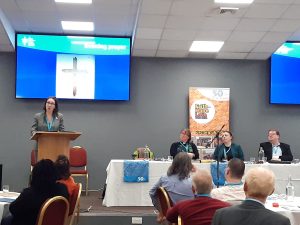
Reporting team: Andy Jackson, Ann-Marie Nye, Stephen Tomkins, Laurence Waring.

